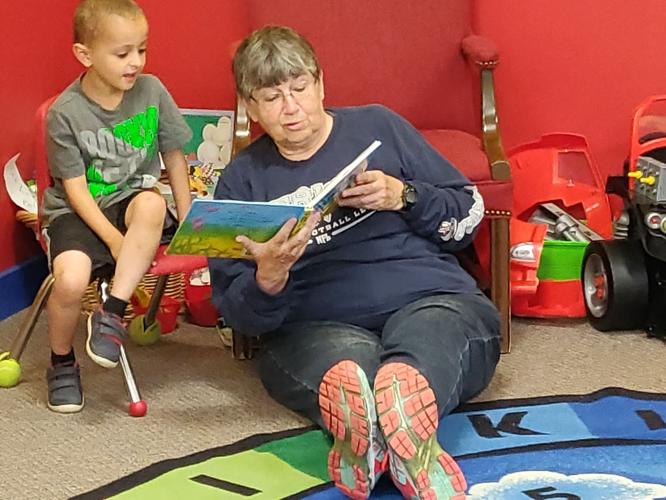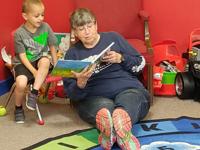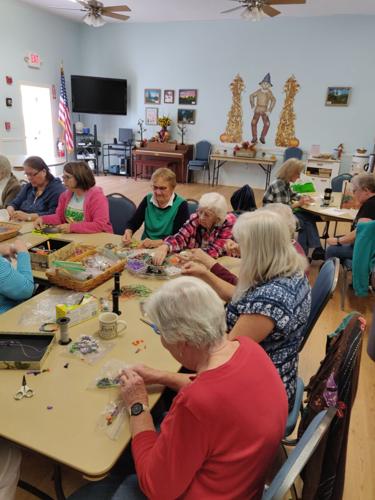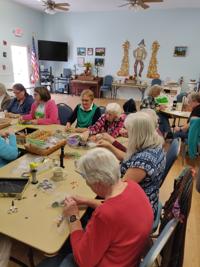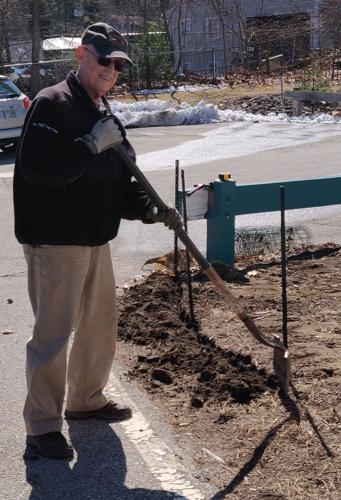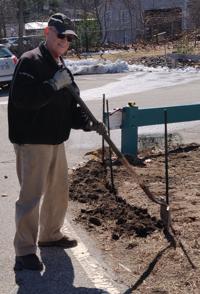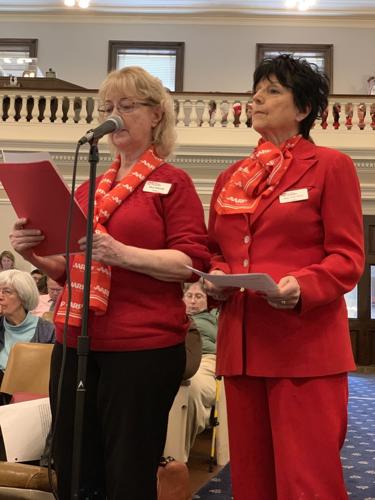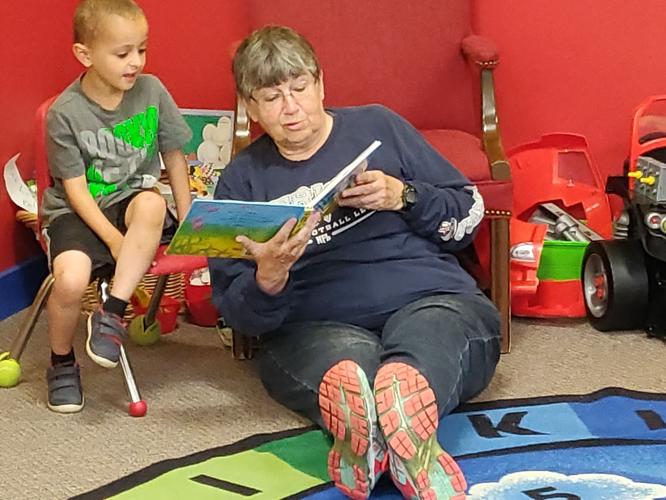Volunteer work includes running activities, working with kids, gardening, policy advocacy and teaching.
KIM TILTON, director of Newmarket Recreation’s Sunrise Sunset Senior Center, didn’t cancel her ukulele classes when COVID-19 hit last year. The volunteer instructor went on teaching, and a dozen members of the Center continued their free lessons. “Of course they can’t sing now, but they continue the ukulele instruction — with social distancing and masks,” Tilton said.
They’ve given all their lives — to family, profession, community. Today’s seniors are still giving back through volunteer opportunities that offer them the chance to share their lifetime of skills or learn brand-new ones.
Tilton uses volunteers inside her center and encourages her members to lend their talents in the greater community. “It gives them a sense of self-worth,” she said of her people, “and they get to share what they’ve learned with others. It’s a win-win.”
Some of Tilton’s internal volunteers are members of the center. Others come in for a specific reason and stay to join. “They get caught up in a group, in what’s going on,” Tilton said.
Her people range in age from the 50s to the late 90s, and all have something to offer, according to Tilton. Because of her proximity to the University of New Hampshire, many of her members are retired professors who lecture on their area of expertise — or, like a retired French professor, on his trip to Cuba. Others are “crafty ladies” who lead workshops on everything from flower arranging to needlework.
Growth in programs
She’s seen the program evolve from her first job in the center, as program manager for Meals On Wheels. Then, volunteers helped serve and cleared tables. As Sunrise Sunset evolved, the opportunities to share grew.
“We now have ‘Tuesday Talks,’ a lecture series with speakers from the UNH system or our own people,” she said. Any topic is possible, from overseas travel to undersea research with a UNH Marine Docent, according to Tilton.
Her people also help run Bingo games, help with the annual craft fair, and work on landscaping around the center.
In the community Tilton’s members volunteer at the Food Pantry and Thrift Store, both operated by the Newmarket Community Church; the town library; the school district; the broader Recreation program; and the Newmarket Garden Club.
When a person retires, the tendency is often to “think you’re a nobody,” Tilton mused. “Volunteering helps you appreciate yourself, your self-worth. And there’s a lot to do out there.”
The volunteer base also helps Tilton keep her costs down, and allows her to offer programs for a nominal cost or free, she said.
AARP volunteer corps
The New Hampshire AARP also has a volunteer base from which they can advocate for seniors, according to Todd Fahey, state AARP director. “The volunteer corps,” he said, “is a critical part of our reason for being and our effectiveness.”
Fahey added, “We leverage their talent, commitment and passions.”
Jeannie Tucker, AARP assistant state director for outreach and advocacy, noted that volunteerism was a building block of the organization and part of the vision of founder Ethel Percy Andrus. “She envisioned an organization run by volunteers,” Tucker said. “We could never do all we do without them — they are our backbone.”
Advocacy roles
Fahey said volunteers are particularly effective in advocacy roles, such as when they testify at the State House on issues affecting elders. A Capitol City Task Force, consisting completely of retirees, monitors what’s going on in the Legislature and often speaks. “They amplify the voice of the 50-plus community,” Fahey said. Before COVID-19, 40 people, all dressed in AARP’s trademark red, showed up to support prescription drug legislation, he said. When everyone’s vaccinated he expects to see similar turnouts, but in the meantime, he said, “They’re still doing it — in the virtual space.”
Education and outreach
The AARP uses a three-pronged structure, according to Tucker: advocacy, education and outreach. The organization makes use of retired professionals to lecture on topics such as fraud, preparing to be a caregiver, and downsizing and decluttering. The last has 175 attendees and was 100 percent virtual, she said.
And the outreach piece is still there and maybe more so thanks to technology, Tucker said. Because of COVID, they’ve been doing more classes and workshops in the virtual space, and have been able to reach more people in the Upper Valley and North Country, she said.
Fahey and Tucker marveled at how “their” seniors have taken hold of technology. “They are our Zoom experts,” Tucker said. “They’re presenters, they’re ‘chat monitors.’”
Their members have embraced technology and are actively engaged with it, Fahey said.
While some older adults continue to work for pay in their field or another, others volunteer and both are good, according to Fahey. “Sometimes you sell your talent, sometimes you donate it,” he said philosophically. “The important thing is that seniors stay relevant and engaged. It enriches them, it enriches whoever they touch.”
And volunteering combats social isolation, Tucker put in. “They form new friendships, they consider each other ‘family.’”
RiverWoods volunteers
Adelle Gabrielson, marketing manager for RiverWoods in Exeter, Durham and Manchester, said volunteerism has been “woven into the tenets of our organization since day one.” The founders envisioned residents who would give back to the world around them, and that has fueled the organization.
Before the pandemic, her residents volunteered extensively both in and outside RiverWoods. Exeter residents gave their time at the St. Vincent De Paul food pantry, the Exeter Festival of Trees, reading at the elementary schools, or, through their churches, with Seacoast Family Promise. COVID-19 kept them home for the past year, but they found new ways to work internally to benefit others.
The Durham campus has a wood shop, and members of that community crafted desks for area children who suddenly found themselves working from home. The Exeter campus has talented needlewomen who spent much of this past winter making blankets for Project Linus, a service for children in crisis. “It’s like a portable hug,” Gabrielson explained.
Business school
One popular program in the Exeter location is the RiverWoods Business School, she said. Many of her members have strong backgrounds in finance and industry. “They were vice presidents of corporations, they were CEOs,” she explained. Some of the retired executives volunteered to teach classes to RiverWoods staff, on finance, marketing, speech and communication and more. Everyone from busboys to administrative staff have participated. “It’s like a mini-MBA program,” Gabrielson said proudly. Students participate in a Capstone project, where they plan a program and pitch it to the administration.
Two recent Capstone projects resulted in the Exeter center acquiring goats and beehives. Both are tended by volunteers, she said.
The locations also sparkle with the help of resident volunteer gardeners, according to Gabrielson, who added, “They’ve gardened all their lives and they miss digging in the dirt.”
.
For more information on AARP, email nhaarp@aarp.org. For information on the Newmarket center, email recdesk@newmarketnh.gove or call 659-8501. For information on RiverWoods, contact Gabrielson at agabrielson@trwg.org. For other information on senior volunteering call the Retired Senior Volunteer Program at 800-536-1193.

